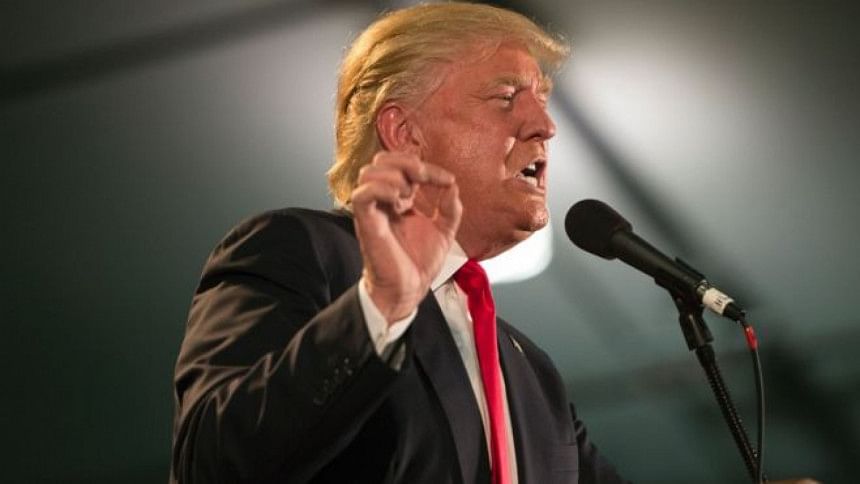Donald Trump's Hispanic voter 'doomsday'

Roque "Rocky" De La Fuente should probably be a Republican.
The walls in the lobby of his San Diego, California, office are dominated by photos in which he's smiling alongside Republicans - Presidents Ronald Reagan, George HW Bush and George W Bush, and 2008 nominee John McCain.
He's donated thousands of dollars to Republican politicians over the past several decades.
When the self-made millionaire talks about government meddling in private industry - his car dealerships, currency exchange stores and real estate ventures - he takes a page right out of the Republican playbook.
"In my business 30percent is owned by the United States government and 10 percent is owned by the state of California. I didn't pick them as partners, but they sure know how to mess in my business," De La Fuente says. "It appears that the more people are trying to be productive, the more government tries to disrupt."
The Rocky De L Fuentes of the world ought to have been easy pickings for a Republican Party whose leaders just over three years ago acknowledged that they were facing a demographic doomsday scenario if they didn't broaden their appeal to the growing numbers of Hispanic voters.
Because of population growth rates, if the Republican presidential candidate won the same percentage of the Hispanic vote in 2016 as nominee Mitt Romney did in 2012 (27percent), according to a study by Republican strategists, he would have to win 64percent of the white vote. No Republican has done that since Ronald Reagan's re-election landslide in 1984.
An even more daunting estimate, from UCLA researchers, finds that if Trump wins the same percentage of the white vote that Romney did (59percent) he would have to carry 47percent of the Hispanic vote - a number only George W Bush in 2004 approached.
If the party were to thrive, Republican National Committee analysts wrote in their 2012 post-mortem, they would have to find a way to make their party more welcoming to minority voters - particularly Hispanics. Immigration reform should be a priority. Outreach efforts must be improved. Off-putting rhetoric should be adjusted.
Instead the party nominated Donald Trump. And a few months after Trump launched his presidential campaign with a sweeping condemnation of a Mexican nation that he said allows its drug-dealers and rapists to enter the US, De La Fuente - who was born in the US but grew up and attended university in Mexico - announced he was also running for president.
As a Democrat
Since then De La Fuente has used his personal fortune to get on the ballot in dozens of states and has received nearly 60,000 votes - good enough for fourth place behind Hillary Clinton, Bernie Sanders and former Maryland Governor Martin O'Malley.
De La Fuente may be an unusual man with an unusual reaction to Trump's calls for mass deportation of undocumented Hispanic immigrants and a wall on the US-Mexico border, but his actions reflect the high price the Republican Party is paying for embracing Trump.
"Trump needs to be stopped at all costs," De La Fuente says, repeatedly referring to the Republican by his derogatory Spanish nickname, "pelos del elote" (corn hair).
"The United States was founded by immigrants who were trying to leave Europe because they had rulers who were making a mockery of people's rights," he continues. "That's why we created the Constitution of the US."
He says that while Trump treats undocumented immigrants as a menace, he views them as assets.
"There's 12 million immigrants currently in the US, with or without papers, with or without the right to be here," De La Fuente says. "I did not ask them to be here. But they're here, and they're doing the work other people don't want to do."
Doomsday arrives
The animosity of Hispanic voters - 77percent of whom have a negative view of Trump according to a March national poll - is a development that has Republican Party officials increasingly concerned.
Senate Majority Leader Mitch McConnell said Trump could be damaging the Republican Party among Hispanic voters the same way 1964 Republican nominee Barry Goldwater's stand against civil rights legislation led to generations of blacks moving to the Democratic Party.
"It did define our party, for at least African-American voters, and it still does today," he told a television interviewer. "That was a complete shift that occurred that year, and we've never be able to get them back."
Hector Barajas, a Republican strategist from California, agrees. He's seen record numbers of Hispanics register to vote in his state over the past few months - an indication that Trump's rhetoric could drive unprecedented turnout among this voting bloc.
"Elections are about addition and multiplication, not subtraction and division," he says. "And as long as you have divisive language, you're making it more difficult not just for yourself to win but for other individuals who are also campaigning, whether you are running for Senate or congressional seats or even down the line for city council."
Barajas co-founded Grow Elect in 2011, an organisation that recruits and trains Hispanic Republicans in California to enter politics. He says Trump is making the task increasingly difficult, as Hispanics in the US wonder why their ethnicity is being singled out for Trump's opprobrium.
"Here you have a group of individuals that are willing to come to this country, work as hard as we work, join in the military, work the long hours just to try to provide a better place for our family and for our society," Barajas says. "Yet at the same time they're targeted with this type of language which is very divisive."
California redux
Barajas should know about the political dangers of words and policies that can be branded as anti-Hispanic. He had a front-row seat in the 1990s, when Proposition 187 - a state ballot measure that sought to deny government benefits, including healthcare and public schooling, to undocumented workers and their children - helped cement the views of Latino voters there against the Republican Party.
"With Proposition 187 you had a very strong campaign that seemed to blame a lot of the ills of California on Hispanics," Barajas says. "You're looking at two generations that have been lost because of that rhetoric."
The initiative passed in 1994 with 59percent of the vote and was credited with helping Republican Governor Pete Wilson win re-election - but it was eventually overturned by the courts. And the only Republican to win a statewide race in California since then was Arnold Schwarzenegger, in a quirky 2003 special election following Democratic Governor Gray Davis's recall,
The spectre of 187 is still used in elections to this day - as Democrats try to paint Republicans, and even some fellow Democrats, as sympathetic to those efforts in the 1990s.
For California Republicans, Barajas says, the tragedy is that they were just starting to put the damage from past battles behind them by focusing on an economic message that could unite a diverse electorate.
"In California, we have a tremendous amount of new jobs that have been created," he said. "But a lot of these jobs are part time and they pay lower wages, and they don't have health insurance or they tend to be in service or in retail. That doesn't do much to provide a leg up for families."
Instead, the Republican Party is left playing defence - in California and in essential general-election battleground states with large Hispanic populations, like Florida, Nevada, Virginia and Colorado.
Barajas worries that even traditionally conservative states like Texas and Arizona could be fertile terrain for Democrats.
Trump undaunted
If the electoral reality confronting the Republican Party is clear, it hasn't changed Trump's views - or his rhetoric.
"We are going to have a strong border, and we are going to have a wall," Trump said at a rally in California last week. "And you know who is going to pay for the wall? Who?"
"Mexico!" the crowd shouted in reply.
"One hundred percent," Trump said. "Not even a question."
Trump has caught particular heat over the past few days after he highlighted the ethnicity of Gonzalo Curiel, the US-born Indiana judge who is presiding over the fraud case against the now defunct for-profit Trump University.
The judge, Trump said, has a conflict of interest because he is the son of Mexican immigrants.
"We're building a wall," Trump said in a television interview. "He's a Mexican."
The comments have been criticised by Trump's fellow Republicans and featured in a Clinton attack video.
Raul Grijalva, a Democratic Congressman from Arizona, says that Trump's comments are the latest example of his strategy to use the Mexican-American community "as a foil".
"Trump is playing his Trump card in this election, and that is to introduce a level of racism in this race that continues to frighten people and he hopes drive supporters to his side," he says. "It is a rhetoric and strategy that further divides this country, and it's not good for anybody."
He doesn't see a way the Republican Party can avoid a long-term electoral disaster from Trump's campaign.
"The Republican leadership has become like the Vichy French," he says. "They've kind of given up."
Efforts to get Trump to moderate his tone are "clearly not working right now," Republican Senator Jeff Flake of Arizona said on Monday.
Unlike most senior Republican officeholders, Flake has yet to fall in line behind his party's nominee. At this point, the #NeverTrump movement is on life support, and the Arizona senator's words are tinged with resignation not resistance.
Trump's remarks on Curiel were offensive, he said, and "if he doesn't change, we're in big trouble".

 For all latest news, follow The Daily Star's Google News channel.
For all latest news, follow The Daily Star's Google News channel. 








Comments